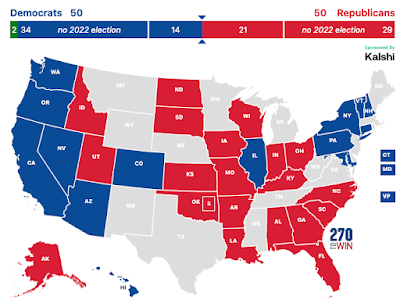Beware (Seemingly) Sound Fundamentals
“McCain greeted the
day of Lehman’s demise at a rally in Jacksonville, Florida. The Dow was already
plunging its way toward a five-hundred-point decline between the opening and
closing bells. “There’s been tremendous turmoil in our financial markets and
Wall Street, and it is—people are frightened by these events,” McCain said. “The fundamentals of our economy are strong, but these are very, very difficult
times. (Game Change, p. 379)
Today,
Team Obama breathed a sigh of relief with the news that the country added
163,000 jobs in July. However, it also finds itself in a precarious position.
While a strong economy would almost certainly guarantee the President a second
term, that’s not what we have. We have an economy that’s teetering on the edge,
exhibiting signs of strength and signs of weakness from one month to the next,
and sometimes simultaneously (Deep in today’s report was news that June’s poor job
report was actually revised downward).
And as the excerpt from Game Change
above reads, if there’s one thing a presidential candidate does not want to do,
it’s to be caught on the wrong side of an economic downturn.
There’s
been a lot of talk about gaffes this week, with Mitt Romney leaving a trail of PR
destruction throughout Europe and the Middle East. Political science, on the
whole, does not sweat these small details. However, McCain’s claim that the
fundamentals of the economy were strong, when they decidedly were not, was a
gaffe of epic proportions. It was not a slip of the tongue that could have
offended a small slice of the electorate. It demonstrated that McCain did not
have a firm grasp on the reality of the most important issue in the campaign. McCain’s
position was understandable. His party had held the White House for the
previous eight years, and he was invested in the success of the economy. But a
voter, watching his 401(k) disappear overnight, could not feel a great deal of confidence
in a candidate that saw the economy as whole.
So even
though Team Obama had to like these numbers, it should think twice before
trumpeting them from a mountaintop. They can turn easily. And if they do, Obama
will not be seen as a resilient leader weathering difficult economic times, but
rather a denier of the country’s financial malaise.
His
fate is already tied to a certain degree to the plight of General Motors. GM’s
success was a key component of his last State of the Union and Obama mentions
it often on the trail. This has given the Romney attack ad machine plenty of
ammunition if things go badly for the automaker, as demonstrated by The Drudge
Report’s handling of the latest GM news pictured on the right.
In
terms of the news cycle, an economic crash can become apparent much quicker than
economic growth, just ask John McCain. So the word for the Obama team to keep
in mind is guarded optimism. They can hope and pray for good economic results,
but in all likelihood the economy is going to remain a mixed bag. The chances
of economic disaster are just as real as the chances of steady growth; the key
for Chicago is to not confuse one for the other.


